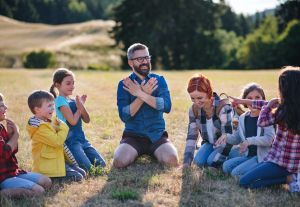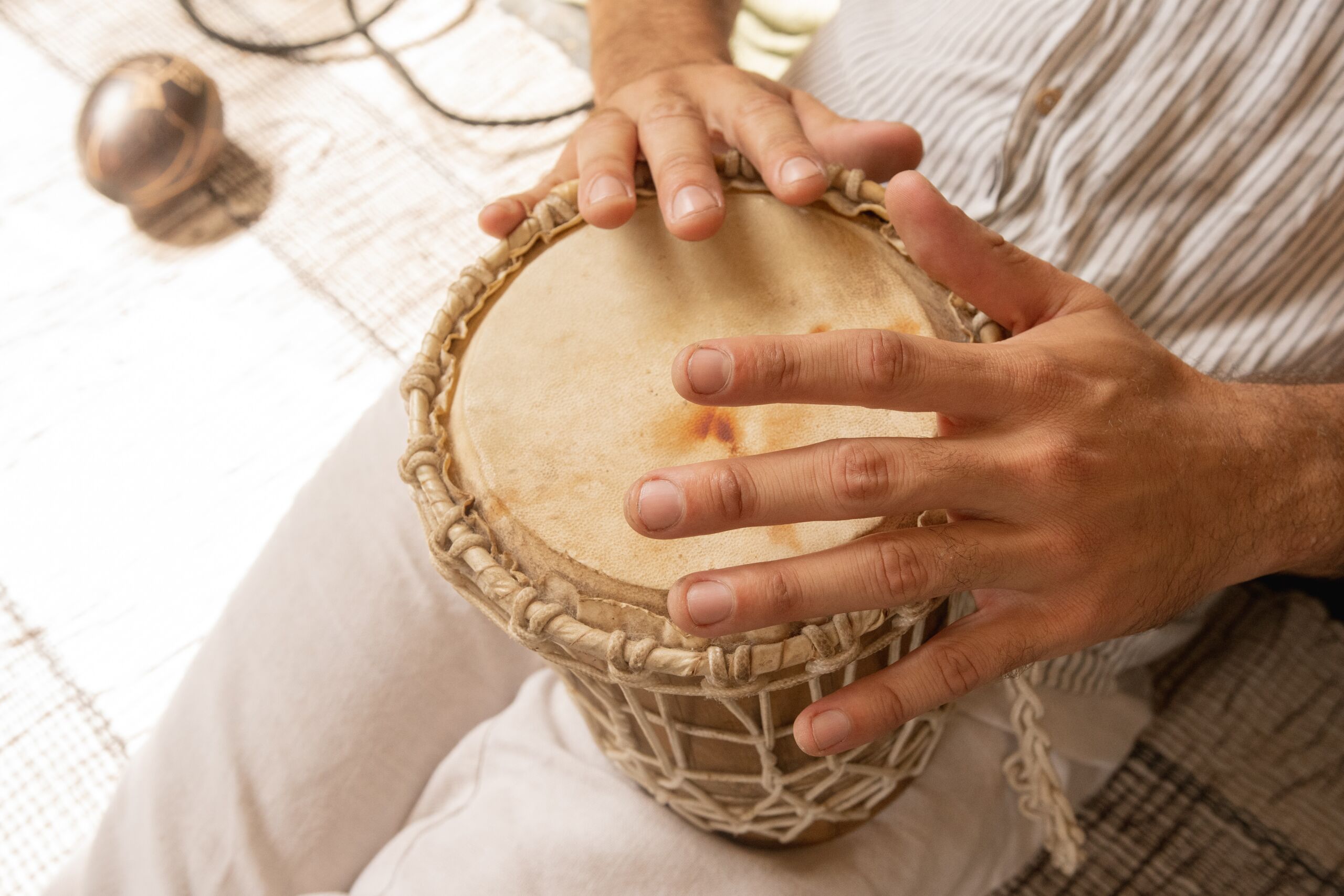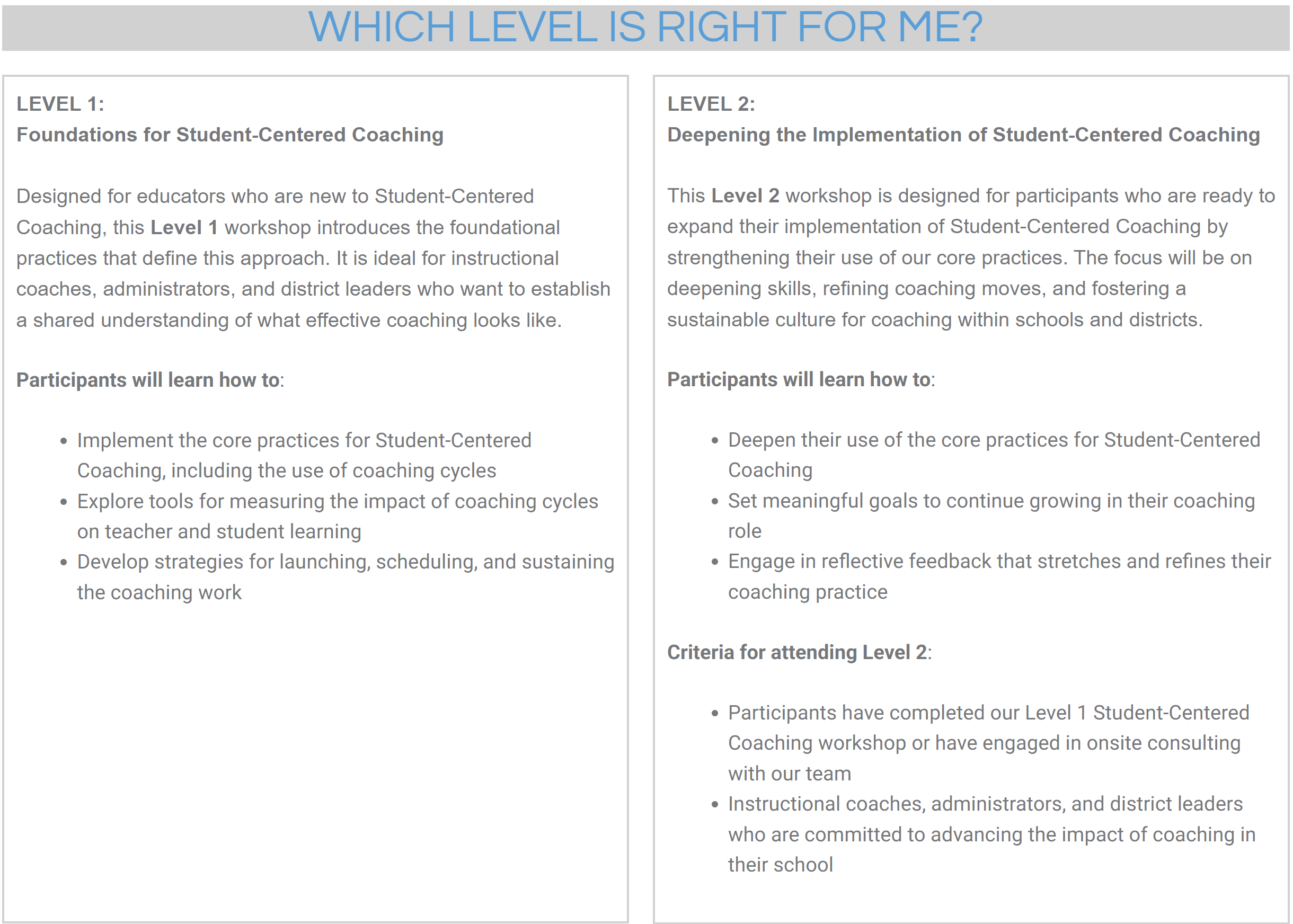I was already feeling a little utzy about the last paragraph of that last post. The royal “we,” the call to arms, the self-righteousness I’ve been trying to extract from my writing (and thinking). And that unexpected turn in my thoughts when my beloved Mr. Keating transformed into a student-shamer, even for just a moment. Clay feet…the harshest realization of all.
That sense of not-quite-getting-it right was swirling around in my head last week when I witnessed an extended moment in Yorel Lashley’s “Building your SEL classroom for youth empowerment” two-day workshop we hosted at North Putnam Middle School.
We had spent the first hour getting familiarized with Yorel’s definition of SEL: “equipping ourselves to be whole people who have a healthy and functional awareness of ourselves, with loving connections to others that allow us to make positive contributions to our communities and gives us power over our own lives.” Having seen Yorel speak before, when he delivered the keynote address at last summer’s learning lab hosted by the Indiana Arts Commission, I was again captivated by the immediacy, urgency, relevance and authenticity of his approach. The “why” that hovers over Yorel’s definition—we need to feel connected to what we’re learning and who we’re learning from/with if that learning is going to be meaningful and life-sustaining—makes so much sense to me, as does his unapologetically idealistic conviction that the role of teachers is “to awaken goals, inspire hope and pave the way to dreams.” His insistence that classroom culture should cultivate “identity, agency [and] belonging” in a “sustained, embedded, intentional” way feels intuitive to me. This is the “what,” “why” and “how” of The Castle, and it is gratifying and rare to hear someone else speaking the same language.
Which is why I was a little caught off-guard by the teaching demonstration that happened in hour two, when 15 students—all with IEPs, some with moderate spectrum and emotional issues, all hand-picked by the principal as students he believed would benefit most from the experience—joined us in the media center for their first “Drum Power” lesson. The kids came in waves, most seemed excited, some not quite sure what they were in for. The chairs were arranged in a circle, with drums in ranging size in front of each. I had already taken a seat with my own djembe, chomping at the bit to get to playing. Kids sat down around me and we chatted a bit—“are you excited?” I asked them, “this is going to be fun!” The boy to my left, who reminded me of my youngest son, gave a shrug and mischievous grin and tentatively pulled his drum closer. Once everyone was assembled, Yorel introduced himself, then went around the whole circle, asking each student their name, if they’d ever played drums, and something that they really like to do. I loved that he took as long as it needed to hear everyone’s answers, and the authentic exchanges that took place, despite the artificiality inherent in any teaching demonstration. He explained the ground rules (no one plays the drums when he or anyone else is talking, two warnings and you’ll be asked to sit in the ‘reflection’ chair—though he was certain that wouldn’t be necessary), the hand gesture to indicate quiet (a fist raised in the air), and then demonstrated the three techniques we’d be learning (palm, slap, bass). As a facilitator of drum circles in schools and in various capacities in the community, I was impressed by the quiet control Yorel commanded over the group. To be clear, Yorel isn’t doing drum circles—he’s introducing kids to West African, Afro-Cuban and Afro-Brazilian drumming through an increasingly complex series of call and response riffs as a vehicle for practicing the three core pillars of Drum Power: discipline, community and leadership.
About halfway through, we were going around the circle again, trying to master a four-beat wave (so, one person plays four beats, then the next, then the next until we’ve made it around the whole circle). When we got to the fourth student in the circle, he sat back in his chair, arms crossed, legs splayed in front of him, refusing to touch the drum.
“That’s okay,” Yorel said, “just try it again. It’s just four beats. Right left right left.” The student glared in the general direction of Yorel, not making eye contact. “Try it again,” Yorel said, unfazed, using his name this time. “This exercise relies on everybody.” The student shifted in his seat, still a full arm’s length from the drum. “Okay, let’s start back at the beginning of the circle and see if you can hear the beat and play it this time. You’re going to need to sit up in your chair and pull the drum towards you.”
The wave began again. Four people in: full stop.
Yorel exhaled, more meditative than impatient. “Tommy,* I want to ask you something. Are you ok?” No response, no eye contact, glare persisting. “I really mean it. When I ask someone if they’re okay, I mean it. It’s not just something I say in passing, like ‘hey, how’s it going’ and then just move on without caring about an answer.” Still nothing. “Tommy, we’re not moving on until you play the four beats. I’m giving you the chance to say you’re not okay, and I care about your answer. But you’re part of this circle and you have a job to do.” Tommy slid further down in his chair. Yorel walked over to him, took his hand and put it on the drum. Tommy pulled his hand away.
I started to feel claustrophobic, made silent eye-contact with my friend who was filming the workshop, glanced around the room to try to gauge how the teachers were processing this, gave a quick smile to the kid sitting next to me who reminds me of my son and who was beginning to fidget. He smiled back but looked down immediately.

Yorel walked back to the middle of the circle and said, “okay, let’s talk about the word discipline. It’s a word you probably hear a lot, but I want to know what you think it means, and I want to hear from every one of you.” We started back around the circle, on the far side from Tommy. The responses were mostly variations of discipline=punishment. A few kids said something along the lines of “it’s what you do when you want to get better at something.” One kid mentioned needing discipline when she rode riding her horses. When the circle came around to the student sitting next to me, Yorel said, “Luke,* what about you? What do you think discipline means?” Luke shrugged and said in monotone, “I don’t know, whatever.” A marked change from the first round, when he gave his name and talked animatedly about fishing, the thing he really likes to do. “What do you like most about it?” Yorel had asked. “The fight,” he had responded, not missing a beat.
Now Yorel dug in, “Really? You don’t know? You’ve never heard the word discipline? Or you’ve never thought about what it means? Trying to get clear what you don’t know.”
Luke shook his head, lips pursed. Refused to enter in. My claustrophobia deepened. And I still couldn’t read the room.
We continued around the circle and then Yorel said what he thought discipline meant: “simply put,” he said, “it means using my energy for good things. It means I have the power to push myself to do better. When I decided I wanted to become a world-class drummer, it meant being very honest with myself that it was going to take discipline to get there.”
Luke and Tommy were still checked out, as well as a third student, Miguel*, who looked like he was alternately sleeping and scowling, his hoodie pulled down to his eyebrows. Yorel taught us a few more rhythms, thanked the students for being there and prompted them to be prepared for day two, when we would keep working together, taking time to stop and consider the other two pillars of Drum Power: community and leadership. “I’ve already seen great examples of leadership here today,” he said, naming specific students who had contributed to the group over the hour and a half lesson. He dismissed everyone, following up with “Luke, Tommy and Miguel, please stick around for a few minutes. I’d like to talk with you.”
Inwardly cringing, I watched as he moved the group into a corner of the circle, trying to assess their body language as he quietly talked with them, head close to theirs, for about seven minutes. He closed with an “okay?” There was some version of a quasi-fist-pump and the kids walked away. They didn’t look annoyed, which surprised me.
“The effectiveness of embedding SEL practices into everything that happens in the classroom is a product of the raw messiness of human relationships.”
* * * * *
For the rest of the day, the teachers (and I) unpacked what we saw in that demonstration. In the immediate conversation that followed, I sat on pins and needles, waiting to hear someone express discomfort at what seemed to me to be publicly calling out these students. It’s the thing I worry about most in my classroom, that I will inadvertently humiliate a student, and those silent moments in the demonstration where we waited as a group for these three students to break the silence, grant us the gift of their buy-in, show us that they were not hurting… felt precarious to me. But again, I was surprised (and relieved) when the teachers expressed precisely the opposite: they were deeply impressed with the way Yorel handled the situation. They provided the backstories for each of the students (Tommy is prone to quickly shutting down if he’s worried he will make a mistake and embarrass himself, Luke had actually held it together much longer than the teachers thought he would, having a tendency to act out violently if he’s pushed too far, and Miguel is living in a no-win situation, a bilingual student with little access to either language, he is straddling the tightrope of being taken out of the “life skills” classes that had been sustaining him in order to start on the diploma track).
When it became clear that none of the teachers had experienced those moments in the demonstration as I had, I told Yorel how uncomfortable the whole exchange had made me and ventured to ask, “when do you think calling out a student becomes humiliation? Would you ever just let a kid not participate?” Yorel answered completely candidly that, in his view, acknowledging a human being struggling in your midst, even if it might make that person uncomfortable to do so, is the opposite of humiliation. Not acknowledging would be humiliation, akin to callously casting aside someone in pain. But it’s also a matter, he clarified, of the other people sitting in the room who are doing what is asked of them. It’s a dismissal of them to act as if there will be no consequence if someone else decides they don’t want to be part of the community that the circle represents. We talked this through with the other teachers, and then on our own at lunch. It’s the tricky dance of power—the paradox of crafting a culture of student empowerment in the midst of gatekeepers who transparently acknowledge their power at the same time that they transparently siphon it off. The effectiveness of embedding SEL practices into everything that happens in the classroom is a product of the raw messiness of human relationships. The approach Yorel takes doesn’t aim to sanitize or simplify. Instead, it is an approach that meets humans where they are, with all the open-endedness and unpredictability that that entails.
“It is an approach that meets humans where they are, with all the open-endedness and unpredictability that that entails.”
* * * * *
I left that first day gratified for the chance to question my own knee-jerk assumptions about how students “should” be treated and much more actively open to the line I’ve always preached that authenticity is the single most important trait for effective teaching: bringing who you are into the classroom. I probably wouldn’t have dealt with Tommy, Luke and Miguel in the same way. I would have found another method—as much aligned with my sense that strong relationships should be the primary currency of the classroom as Yorel’s methods are with his similar sense. Who knows what my method would have yielded. But the proof of Yorel’s effectiveness (and by effectiveness I mean his ability to reach these kids) is in the pudding: on the second day, when Yorel smiled at Luke and asked, “how are feeling today?” Luke responded, huge grin on his face: “I feel great. I got such good sleep last night!” Then we went around the circle, trading beats, and Tommy pounded his out with authority, no hesitation. And at the end of the demonstration, several kids stayed back to have an impromptu jam session, Miguel using Yorel’s own djembe. When he left, he waved with both arms, saying, “thank you so much. I had so much fun today!”
Here’s a sneak peek into Yorel’s workshop.
Resources
Please login or register to claim PGPs.
Alternatively, you may use the PGP Request Form if you prefer to not register an account.




